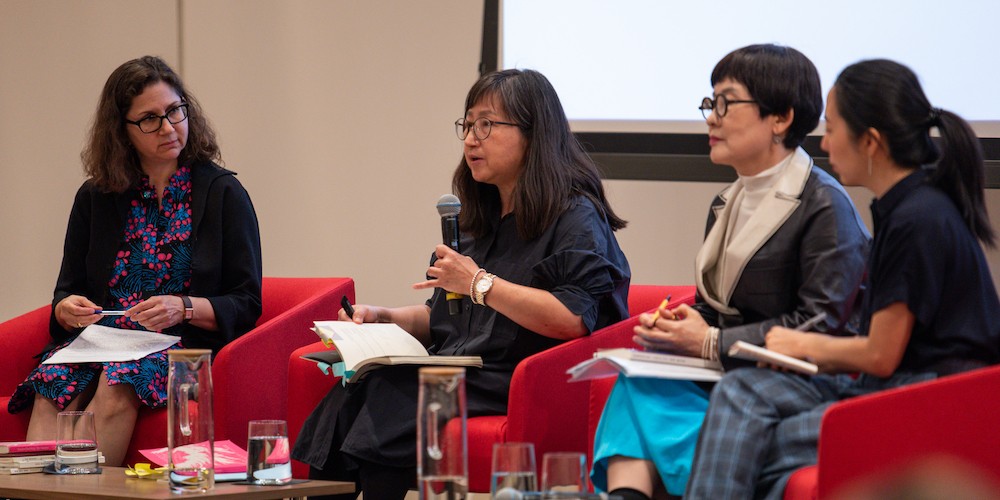Exhuming the Unspoken: An Evening With Kim Hyesoon and Don Mee Choi
Her work has been described as incendiary, urgent, and radically feminist—as a conduit for a collective voice, a conduit for collective grief. On October 4, 2023, poet Kim Hyesoon joined her decade-long translator and fellow poet Don Mee Choi for a special evening at Columbia University School of the Arts’s Lenfest Center for the Arts, where they read excerpts from their work and spoke about their creative processes and experimentation.
Second-year Writing students Eunsun Whang and Roz Naimi presented introductory remarks to audience members, discussing the impact of the artists’ work and the intersection of language, memory, and power.
Whang expressed that she was “personally indebted” to Kim Hyesoon. Noting her grandmother’s escape and exile from the 38th parallel north, Whang described Kim’s poetry as “disruptive and revealing.”
“Kim creates a language unscathed by colonial constraints,” Whang said. “In Kim’s work, the unspoken is speaking and the poet listens and unburies the experiences that were once in hiding. A melody exists in this strangeness—one that is too familiar, too familial.”
Don Mee Choi’s poetics and translations of Kim’s work are a practice of “visceral provocation,” Naimi said. Naimi also made note of Choi’s “craft interventions” into the space of colonization and military violence and highlighted Choi’s interrogation of the language of structural domination and the United States’s imperial legacies.
“What draws me to [Choi’s] work over and over again is its movement, its heteroglossia,” Naimi said. “Like a chorus, she amplifies the voices of the dislocated, the obscured, the homesick.”
Written by Kim and translated from the Korean by Choi, Phantom Pain Wings (New Directions, 2023) marks the latest collaboration between the artists. Together, Choi and Kim read from the collection, their performance accompanied by surrealist sketches cast on a projector screen.
“This book is not really a book,” Choi read. “It’s an I-do bird sequence / a record of the sequence…Poetry ignores / the I-do-bird-woman sequence. Woman-is-dying-but-bird-is-getting-bigger sequence. / She says, The pain is killing me / When my hands are tied and my skirt rips like wings…”
Birds are a recurring image in Kim’s poetry—as are depictions of haunting, mourning, and struggling against gendered violence. In another poem, Kim addresses thematic elements of abandonment and absence. “Daddy, I was born here, yet I’m told to escape,” Choi read. “They all know my face. They’ll kill me if I breathe. I’m not allowed to cry.”
Following the reading, Literary Translation at Columbia (LTAC) Director and Writing Professor Susan Bernofsky led a conversation with Kim and Choi. Bernofsky pointed out the use of political and historical material in the creation of their art before asking each poet about the meaning of beauty in their own work.
“I don’t think of things [like pain] as ugly,” Kim responded via a translator. “I rather think of them as wings of farewell in the sky, as the movement that wings make.”
Choi, meanwhile, touched on her experience searching for different modes of language for memory and trauma while working on her 2020 collection, DMZ Colony, which braids together memoir, translation, and oral history. “I questioned the connection between cruelty and beauty,” she said.
Bernofsky, Choi, and Kim also discussed the notion of an oppressive language and the crossing of borders beyond the boundaries of language. Kim brought up the marginalization of women’s voices within the landscape of Korean poetry, and her attempts at finding “new territory” as a female writer.
“Poems can be used as a way to beautify the mother tongue, but I also feel like the purpose of poetry is to wash away the filth or the dirt that is sometimes upon language,” Kim said. “The act of writing poetry is a process of throwing off the shackles that encase language and letting it be free in its natural state.”
The reimagination of poetics and the reinvention of the politics of expulsion charge both Kim and Choi’s bodies of work. They write and translate along currents of historical archive and lyrical subversion.
“You could say I’m writing to a ghost reader,” Kim said near the end of the evening. “I’m writing to ghosts beyond space and time.”
The event was co-sponsored by the Center for Korean Research at Columbia University and The Society of Fellows and Heyman Center for the Humanities. Copies of Phantom Pain Wings and DMZ Colony can be purchased here and here.
